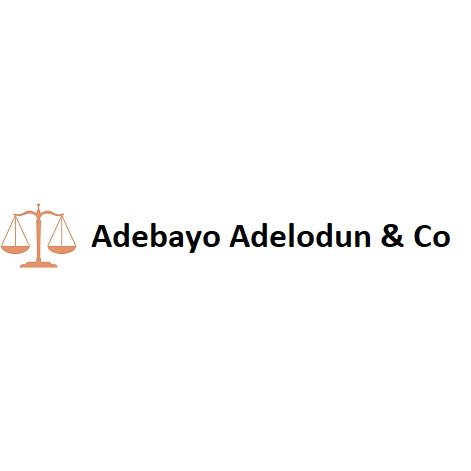Best Hiring & Firing Lawyers in Ilorin
Share your needs with us, get contacted by law firms.
Free. Takes 2 min.
List of the best lawyers in Ilorin, Nigeria
About Hiring & Firing Law in Ilorin, Nigeria
Ilorin, like the rest of Nigeria, follows federal labor laws which are primarily governed by the Labour Act. This law outlines the general framework for hiring and firing, setting standards for employment contracts, minimum wage, working conditions, and termination processes. It seeks to protect the rights of both employers and employees by stipulating fair practices and procedures. Additionally, cultural practices and local business customs in Ilorin may influence employment relations, making it important to consider local nuances while navigating hiring and firing processes.
Why You May Need a Lawyer
Navigating the complexities of hiring and firing can be challenging for both employers and employees. Several situations may necessitate legal consultation, including:
- Entering or terminating employment contracts without clear terms.
- Allegations of wrongful termination or unfair dismissal.
- Issues regarding severance pay or benefits.
- Clarification of employee rights under the Labour Act.
- Negotiating terms of employment, such as salary and working hours.
- Addressing workplace discrimination or harassment complaints.
- Adhering to local compliance when setting up business operations.
Local Laws Overview
Key aspects of local laws in Ilorin regarding hiring and firing include:
- Employment Contracts: Must be clear and written, detailing the terms, conditions, and nature of the employment.
- Probationary Periods: Generally allowed for assessing employee performance before confirmation, usually not exceeding six months.
- Termination of Employment: Requires a fair process including notice periods as stipulated by the Labour Act (minimum one week’s notice for short-term employees and three months for long-term staff).
- Severance and Benefits: Employees who are terminated are often entitled to severance pay, depending on contractual terms and duration of employment.
- Discrimination and Harassment: Employers must provide a workplace free from discrimination based on gender, age, ethnicity, etc.
- Health and Safety: Employers are responsible for maintaining safe working conditions.
Frequently Asked Questions
What should be included in an employment contract?
An employment contract should include the job title, job description, salary details, working hours, probation period, leave entitlements, notice period for termination, and any other relevant terms of employment.
Is a verbal job offer legally binding in Ilorin?
A verbal job contract can be considered legally binding, but it is always advisable to have a written agreement to avoid disputes and ensure clarity of terms.
What is the appropriate process for terminating an employee?
Employers must provide a written notice of termination along with the reason for dismissal, ensuring it aligns with the stipulated notice period or payout in lieu of notice as per the employment contract.
Can an employee be fired without notice?
Immediate termination without notice may occur in cases of gross misconduct. However, employers must have substantial evidence to support their decision to avoid claims of wrongful dismissal.
Are there protections against unfair dismissal?
Yes, the Labour Act protects employees from unfair dismissal. Employees can contest the dismissal if it is believed to be unlawful or unjustified.
What steps should be taken if I experience workplace discrimination?
Employees should report discrimination to their HR or management team, and can seek legal advice if internal resolutions are unsatisfactory. Legal claims can also be pursued through the courts.
How is severance pay calculated?
Severance pay calculations often depend on the terms agreed upon in the employment contract, length of service, and company policies.
Can employers conduct background checks on potential hires?
Yes, employers can conduct background checks, but they must be relevant, non-discriminatory, and comply with privacy laws.
What legal recourse do I have if wrongfully terminated?
Employees who have been wrongfully terminated can file a claim with the industrial court to seek compensation or reinstatement.
What role does the National Industrial Court play?
The National Industrial Court is the judicial body responsible for handling labor-related disputes and ensuring justice in employment matters.
Additional Resources
For further guidance, individuals may consult the following resources and organizations:
- The Ministry of Labour and Employment: Offers information on labor laws and rights.
- The Industrial Arbitration Panel: Handles disputes involving employment relations.
- Legal Practitioners: Local law firms specializing in labor law can provide personalized advice.
- Online Resources: Websites offering insights on Nigerian labor laws and best practices.
Next Steps
If you require legal assistance with hiring or firing issues, consider the following steps:
- Document all relevant employment details, communications, and actions taken or received.
- Consult with a qualified labor attorney in Ilorin to understand your rights and legal options.
- Engage with local labor offices or mediators for non-judicial dispute resolutions.
- Prepare for potential legal proceedings by gathering evidence and witnesses if required.
Taking proactive legal steps can safeguard your interests and ensure compliance with relevant labor laws in Ilorin, Nigeria.
Lawzana helps you find the best lawyers and law firms in Ilorin through a curated and pre-screened list of qualified legal professionals. Our platform offers rankings and detailed profiles of attorneys and law firms, allowing you to compare based on practice areas, including Hiring & Firing, experience, and client feedback.
Each profile includes a description of the firm's areas of practice, client reviews, team members and partners, year of establishment, spoken languages, office locations, contact information, social media presence, and any published articles or resources. Most firms on our platform speak English and are experienced in both local and international legal matters.
Get a quote from top-rated law firms in Ilorin, Nigeria — quickly, securely, and without unnecessary hassle.
Disclaimer:
The information provided on this page is for general informational purposes only and does not constitute legal advice. While we strive to ensure the accuracy and relevance of the content, legal information may change over time, and interpretations of the law can vary. You should always consult with a qualified legal professional for advice specific to your situation.
We disclaim all liability for actions taken or not taken based on the content of this page. If you believe any information is incorrect or outdated, please contact us, and we will review and update it where appropriate.












